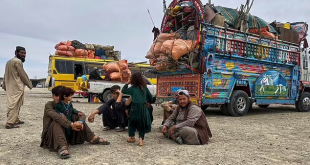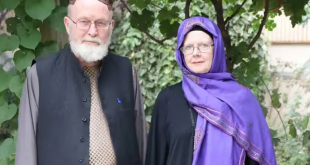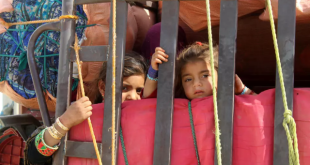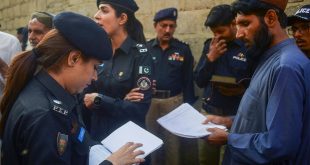By Elham Kabir
It has been almost four decades since the war in Afghanistan flamed—the chaos begins after the collapse of Mohammed Daoud Khan government on 1978 by Soviets-USSR alongside with its Afghan allies. On 1979, the Soviet Union invades Afghanistan, under the pretext of upholding the Soviet-Afghan Friendship Treaty of 1978. Afterwards Afghans were witnessed of many antagonisms—from occupying each-other’s governments to the rising of Mujahedeen (the holy worries). The Soviet invasion ended with the withdrawal of the Red Army in 1989. But the war in Afghanistan continued. The demise of the communist regime led by the PDPA in April 1992 only paved the way for an internecine conflict between the Islamist mujahedin factions. The emergence of the Taliban in the mid-1990s ultimately attracted a U.S.-led Western military invasion after terrorist attacks in September 2001 that killed thousands in New York and Washington were linked to Al-Qaeda in Afghanistan. Nineteen years later, there is still no end in sight for war in Afghanistan. Thus after US-Taliban Agreement on 9th march 2020 which paves the way for a total ceasefire between US-Taliban and a so-called Intra-Afghan talks for bringing peace in Afghanistan—but Afghans continue to bear the brunt of war in their country. According to the UN, more than 100,000 Afghan civilians have been killed or wounded in Afghanistan since 2009 and with the growing power of the Taliban, Islamic state-ISIS and other anti-government groups, war is expanding and Afghans are being sacrificed.
Afghans from East to the West and from South to North, same as the inhabitants of war-torn countries such as Libya, Syria, and Lebanon, want to experience eternal peace in their country—but war in Afghanistan and the failure to reach long-lasting peace has more to do with the foreign intervention of regional and international countries into Afghanistan’s domestic politics—for their own rivalry and core interests regionally and internationally. The main aim of this article is to answer the fundamental question regardless of—why Afghanistan is not achieving lasting peace? In order to answer the question, it is very vital to distinguish contemporary phenomena such as:
- The balance of power and crump of emerging Asian and European countries by the United States;
- The sudden growth of Pakistan’s military power, especially during the Cold War;
- Ethical unlikeness among the royal family—and the political and strategic oversights of leaders in Afghanistan.
The Balance of Power
For more than five hundred years, peace has been achieved in various countries around the globe on the basis of the balance of power between states/nations. Perhaps because of the strength of such model—this theory is now considered one of the most authoritative and useful theories of international relations. Balance of power theory dictates that if a country’s power is not balanced by other countries, it will likely force most other countries to accept its demands, or there will be a conflict to re-establish the balance of power.
Afghanistan, with its extraordinary strategic location, has always been used as a buffer state with the aim of balance the power of regional and global competitors. For instance, in the early nineteenth century, after the British dominated the Indian subcontinent and the Tsarist Russian Empire’s desire to expand its imperial bases to the south and reach the warm waters, Afghanistan became a barrier between the two empires.
In the cold-war era, Afghanistan has once again become a strategic point for proxy wars between the two major blocs, the Soviet Union in the East and the United States in the West at the height of the Cold War. The United States seeks to strike a balance between the most powerful countries in Asia and Europe, based on the theory of “power of balance”. The greatest goal of the Americans for the first half of the twenty-first century is for no country at the Asian or European continent to become a unified power, for the reason that consequently then it will become a serious rival to the United States at the international arena. Thus, the balance of power between the European Union—China and Russia—is the main focus of Western political interests in this region.
And yet the questions arise that—in the flame of battel for regional and international hegemony, why Afghanistan is burning? After all it is because Afghanistan has four deterrents for major Asian and European countries; such as:
- Islamic fundamentalism;
- Opium cultivation and trafficking;
- Energy corridor;
- The great struggle of the young generation.
That each will try to use them in contradiction of their competing countries, thus to gain power and safeguard their core interests in the sphere of their influence.
Growth of Pakistan military power—during the Cold War
FOR decades, the Pakistan state has been criticized for its alleged links with militant groups. The Taliban and Haqqani Network in Afghanistan, Jaish-e-Mohammad in Kashmir and Lashkar-e-Taiba in India have all been the subject of consistent and widespread international complaint. The officials in Afghanistan have not been able to counter the influence of their Pakistani counterparts, who very cunningly infused their version of state of affairs in the region/Afghanistan. As a result, Pakistan has always been seen as player in any potential political settlement in Afghanistan. It is noteworthy to mention that this partly due to exponential growth of Pakistan military myth as well as atomic power
According to Steve Coll’s book the Ghost Wars—during the Cold War, with the financial support of the United States, Pakistan’s military power grows unexpectedly, and Pakistan’s encroachment on Afghanistan’s soil and politics. Afghanistan’s use of land against India, and support for international terrorism. Therefore, at hand there are two undeniable facts in the sudden growth of Pakistan’s military power: one is that Pakistan’s power will not be lost in a short period of time, and Afghanistan alongside with its allies have to consider it as a solemn authenticity for few more decades. The claim for a greater Afghanistan has not been advanced with any serious intent for decades. And being seen to have influence over the Afghan Taliban has also helped Pakistan in its relationship with the US—and in order to bring eternal peace for Afghanistan, Pakistan’s existence in peace process is vital and needy, besides it cannot be gained through fighting.
Ethical unlikeness and the political and strategic oversights
The most significant task of a country’s political elites is to systematically study the state of the balance of power between countries and before any imbalance brings the power of war to their country, they must have added to the power of their country to re-balance. But when country’s political leaders/elites are engaged in internal strife, possibilities arise to ignore the unbalanced growth of the power of neighboring countries and ultimately, to prevent war and instability in their own country. Probably that’s why governments are either urging their internal insurgents to suppress or negotiate so heavily, because they know that the ground for intervention is quickly being taken by powerful countries when the nation is not mobilized.
Secondly, the evolution of nationalistic discourse in Afghanistan hadn’t took place, to develop a coherent national identity that would unite the diversity of Afghans. Afghanistan may be independent, but is it free? It has a state, but does it have a nation? A nation-state is not just a territorial entity. It is also an idea, a habit, a lived experience. What is the idea of Afghanistan? When we speak today of Afghans desiring a progressive society and seeking to liberate themselves from the theocratic absolutism of the Taliban, whose story are we telling? Conversely, when we consider that many among the Taliban are not simply armed insurgents, equipped with a template of hatred by a neighboring state, but also an alienated constituency defending traditional Pashtun values, Islam, and their village identity, whose views are we representing? And when President Ashraf Ghani wrote, in 2018, about a ceasefire with the Taliban demonstrating the strength of Afghan national identity, which identity did he refer to?
Conclusion
First, the main cause of misery and not exercising eternal peace in Afghanistan is the foreign interventions that have always brought political fragments and instability, ethnocentrism, and ideological and civil-wars, and provided the ground for new plagues, that Afghans have witnessed throughout history. Unfortunately, another factor in Afghanistan is the differences and lack of political independence, absolute illiteracy, racial and ethnic discrimination, nationalism, lack of meritocracy, lack of a dynamic economy and unequal distribution of ethnicity in power and politics.
Second, Afghanistan is receiving millions of dollars for military and economic purposes annually from international community—likewise other nations such as Japan, Sri Lanka, Mexico and Pakistan back then—which most of the countries, in particular Pakistan is still receiving the aids. Afghanistan ought to control those aids, reduce the corruption and use the aids receiving from Int’l community in strengthening of its economy and military capabilities in order to shortening the hands of other countries to either interfere, invade or use Afghanistan’s soil for their proxies.
Third, Afghanistan should not enter unto any regional or international war for now, because fighting more and more will weakening Afghanistan’s military aptitude in such situation which effects country’s economy and this is exactly what Pakistan wants. instead Afghan gov’t ought to enter into a deal with Pakistan, at least for few years, which will eventually reduce the current proxies and war in Afghanistan soil. For the very reasons mentioned, peace would be distant dream for Afghanistan. a distant. However, a good balance of power, a well-designed regional collation and investing in winning hearts and minds may help in casting light at the end of tunnel.
The writer is working as a communication officer for, Afghanistan Airfield Economic Development commission at ARG—Presidential Palace. And currently studying Master’s Program in International Relations
 Afghanistan Times
Afghanistan Times




